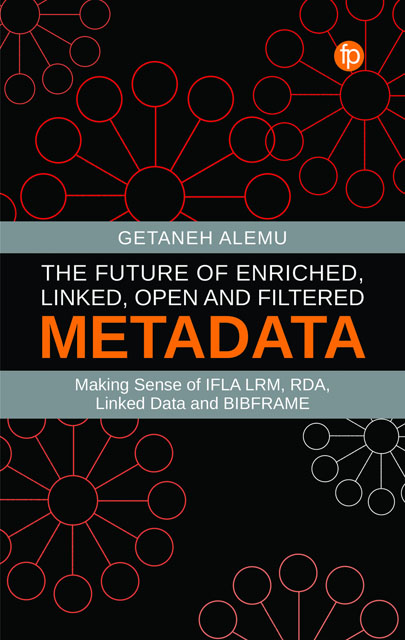 The Future of Enriched, Linked, Open and Filtered Metadata
The Future of Enriched, Linked, Open and Filtered Metadata Book contents
- Frontmatter
- Contents
- Figures
- Tables
- Code snippets
- About the Author
- Preface
- Acknowledgements
- Abbreviations
- 1 Introduction to Metadata
- 2 Metadata Strategies and Quality Indicators
- 3 Metadata Use Cases
- 4 Contemporary Metadata Principles
- 5 Enriched and Linked Metadata
- 6 Open Metadata
- 7 Filtered Metadata
- 8 FRBR, LRM and the Notion of Work
- 9 Resource Description and Access (RDA)
- 10 BIBFRAME: A New Metadata Framework
- 11 Crowdsourcing and User-Generated Metadata
- References
- Index
2 - Metadata Strategies and Quality Indicators
Published online by Cambridge University Press: 18 November 2022
- Frontmatter
- Contents
- Figures
- Tables
- Code snippets
- About the Author
- Preface
- Acknowledgements
- Abbreviations
- 1 Introduction to Metadata
- 2 Metadata Strategies and Quality Indicators
- 3 Metadata Use Cases
- 4 Contemporary Metadata Principles
- 5 Enriched and Linked Metadata
- 6 Open Metadata
- 7 Filtered Metadata
- 8 FRBR, LRM and the Notion of Work
- 9 Resource Description and Access (RDA)
- 10 BIBFRAME: A New Metadata Framework
- 11 Crowdsourcing and User-Generated Metadata
- References
- Index
Summary
Overview
Metadata is a central component of any informationorganisation function. If metadata is key for thefindability, discoverability and usage of valuableinformation resources, it needs to be approachedstrategically rather than on an ad hoc basis. Ametadata strategy plays a vital role in effectivelyingesting, creating, managing, storing, curating,harnessing, using, reusing and sharing metadata.Some of the key components of this strategy includemetadata expertise (knowledge and skills),standardisation, internationalisation,interoperability frameworks, metadata processes,workflows, systems, formats and tools. But mostimportantly, a metadata strategy begins with a clearunderstanding of the values and purposes ofmetadata. All stakeholders, including users,metadata personnel, systems managers and seniormanagement, must be involved at this stage. Ametadata strategy needs to be aligned with theoverall institutional vision, mission and goals.Institutional, user and collections requirements arecritical for any metadata strategy. Since the futureis uncertain, a metadata strategy needs to scan theenvironment, identify the competition, assesspotential risks, and capitalise on the strengths andopportunities. Ask questions such as: what is ourcompetitive edge? What is the value proposition forour metadata? It is important to note that metadataalso has ethical considerations such as the use ofcontrolled vocabularies, intellectual propertyrights, privacy concerns, classification schemes,accessibility guidelines and inclusivity.
An institutional metadata strategy needs to guide staffdevelopment, choice of standards, and development ofmetadata policies, systems and tools. A metadatastrategy needs to be SMART – specific, measurable,achievable, realistic, and time-bound. The types ofcollections we have and user requirements inform ourchoice of metadata standards. It is also possible tomix and match metadata fields from across standards.For example, the Metadata Encoding and TransmissionStandard (METS) provides an XML framework to combinedescriptive, administrative, structural andtechnical metadata elements from different standards(Gartner, 2016).
A metadata strategy covers:
• metadata sourcing and costing
• metadata staff development
• metadata standards, systems and tools
• metadata ownership and management
• metadata licensing
• metadata use, reuse and sharing.
A metadata strategy is a roadmap that outlines futuredirections by systematically analysing userrequirements, changes in technologies, standards andinnovations. The strategy may include a strategicstatement or vision which consists of the expertise,resources and systems requirements for the overallmetadata function.
- Type
- Chapter
- Information
- The Future of Enriched, Linked, Open and Filtered MetadataMaking Sense of IFLA LRM, RDA, Linked Data andBIBFRAME, pp. 41 - 76Publisher: FacetPrint publication year: 2022


